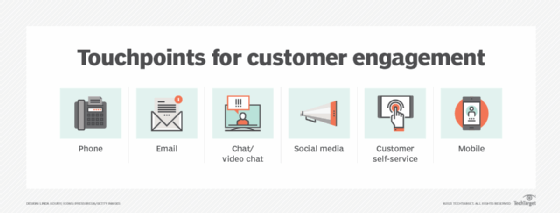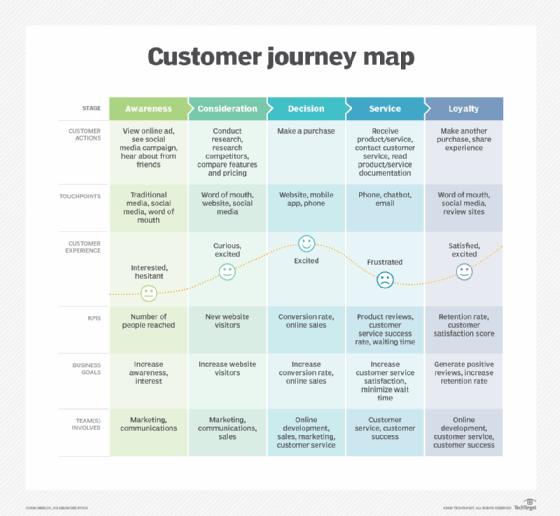What is a 360-degree customer view?
The 360-degree customer view is a comprehensive approach to understanding customers by compiling their individual data from various touchpoints into a single view. This approach reflects modern business's recognition of the importance of customer-centricity in fostering loyalty, enhancing service and driving growth.
A 360-degree customer view offers holistic insight into a customer's interactions, preferences and history with a business. Data is gathered from multiple customer touchpoints. It's then compiled and integrated to provide organizations with a comprehensive understanding of their customers, facilitating informed decisions.
Customer information available from a 360-degree view helps identify important characteristics such as customer profiles, behavior, loyalty and demographics. This data is used to create marketing campaigns, with messaging designed to cross-sell and upsell customers during interactions. It also can minimize customer churn and facilitate customer retention.
Effective customer insight is essential when creating an effective marketing campaign. Without a 360-degree view, customers' preferences, activities and views might remain elusive.
Why is a 360-degree customer view important?
The following are some specific reasons why a 360-degree customer view is important:
- Unified customer view. By consolidating electronic data from sources such as electronic data interchange and advanced customer relationship management (CRM) systems, as well as sales data, social media interactions, website analytics and customer support interactions, organizations can create a unified customer profile. This helps in obtaining a holistic view of customer behaviors, preferences and needs.
- Effective customer segmentation. With the information gleaned from a unified customer view, businesses can group customers according to common characteristics, behaviors and preferences, and then build targeted marketing for each customer segment.
- Better customer experience. With a 360-degree view of their customers, organizations can provide personalized and tailored customer experiences. These might include relevant product recommendations, personalized offerings and targeted communication. A personalized approach increases customer satisfaction and encourages loyalty.
- Data-driven decision-making. The insights organizations get from a 360-degree view of their customers can drive strategic decisions on ways to improve products and services, as well as provide a personalized customer experience.
- Better customer service. A comprehensive view of the customer gives customer service representatives access to complete customer profiles, enabling them to address customer inquiries and resolve issues faster and more effectively.
Components of a 360-degree view
Creating a 360-degree customer view requires a blending of various components, each critical to the entire construct:
- Data collection. This involves gathering a spectrum of data and customer intelligence, ranging from the basics, such as contact information, to details about purchase history and feedback.
- Touchpoints. These are the customer data platforms and channels where businesses interact with customers, including e-commerce, direct feedback, social media platforms and email.
- Integration. Data from various touchpoints is consolidated for subsequent analysis. Integration is the process of merging of this data from disparate systems into a single, comprehensive view.

Sources of 360-degree data
There are a number of ways businesses collect data on their customers:
- History of customer activity. Being able to analyze buying patterns, the amount of money spent and brands selected can better pinpoint what approaches and methods are likely to drive more sales.
- Feedback from customers. Data from various methods of capturing customer opinions and feedback, such as surveys, can be efficiently analyzed using artificial intelligence (AI) and natural language processing if recorded messages are being analyzed.
- Loyalty of customers to the company. Analysis of customer buying patterns and other data can establish the level of customer loyalty; loyalty programs are important for customer retention and sales.
- Registration and login data. Demographic information, geographic locations, level of education, number of family members, and social media preference and usage patterns are all data points that can be collected during various registration processes with customers.
Benefits of a 360-degree customer view
Building and understanding a customer's complete profile provides many benefits:
- Enhanced customer understanding. With a 360-degree view, businesses can more accurately predict customer needs and preferences, and respond with efficient, personalized interactions.
- Personalized marketing. By supporting the customer journey map, businesses can tailor their marketing initiatives and strategies to customer needs, ensuring a higher level of engagement and conversion rates.
- Improved customer service. A holistic view means that customer service representatives can access a customer's entire history, providing a starting point for superior service.
- Operational efficiency. With data consolidated into a single viewpoint, businesses can streamline their processes, making operations smoother and more efficient.

Challenges of a 360-degree customer view
While cultivating a 360-degree view is sensible, it comes with some requirements and caveats:
- Potentially high costs. The technology necessary to achieve aggressive marketing campaign goals is often costly. A business must be willing to accept that burden.
- Success hinges on solid data. A 360-degree view requires a lot of data. If a business uses imperfect data or draws incorrect conclusions from its data, the results could show up in lost revenue or reduced customer loyalty.
- Proper training is required. If the customer service team isn't properly trained, the program could fail; the same applies to customer-facing CRM systems.
Best practices for building a 360-degree customer view
To build a 360-degree customer view, the following 10 steps are recommended:
- Determine the goals for a 360-degree customer view, such as more cross-selling or better customer retention.
- Ensure CRM systems are optimized for a 360-degree approach.
- Establish the data sources, determining where they're located and the kinds of data they produce.
- Sanitize the data to ensure it's ready for processing.
- Consolidate the various data sources into a single entity.
- Build a customer profile that captures all relevant data.
- Set up a process for data management.
- Define how the data is to be used and who will use it.
- As data is used, continuously review and improve it.
- Periodically review the overall program to ensure it's effective.
Additionally, a business should establish an ongoing program to manage all aspects of the customer marketing experience. CRM and other systems used to optimize performance should be evaluated and updated regularly.
AI and automation are expected to be a major force in collecting and analyzing customer data. See how your businesses can achieve 360-degree view of your customers using AI.






